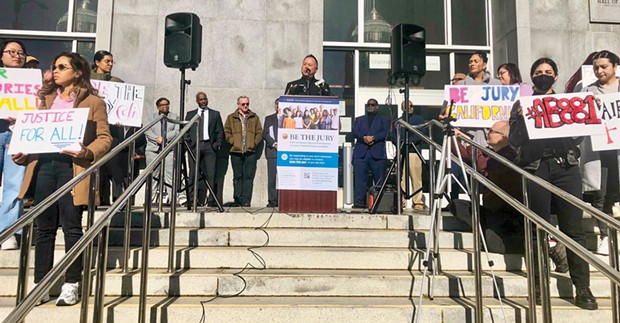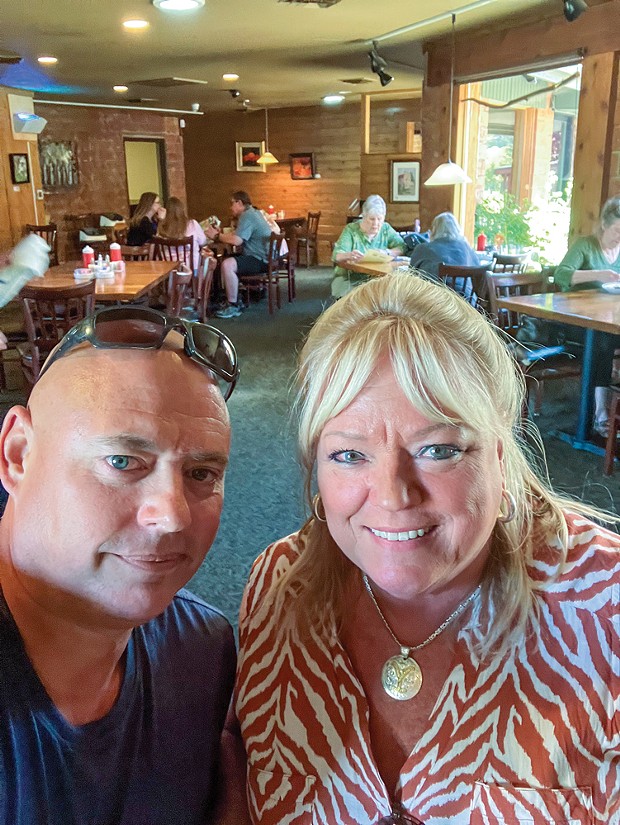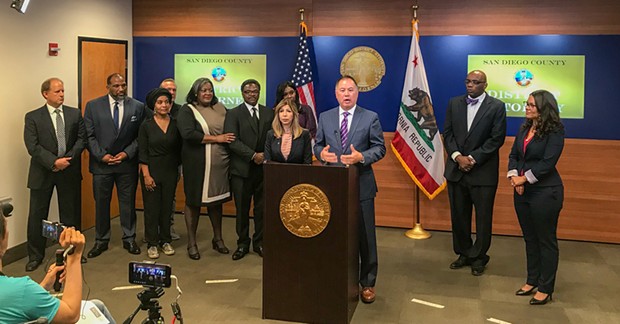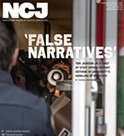'The Ends of Justice'
The 'activist attorney' who changed state law to free Steven Dinsmore
By Thadeus Greenson [email protected] @ThadeusGreenson[
{
"name": "Top Stories Video Pair",
"insertPoint": "7",
"component": "17087298",
"parentWrapperClass": "fdn-ads-inline-content-block",
"requiredCountToDisplay": "1"
}
]
When appellate attorney Richard Braucher agreed to take on Steven Dinsmore's case, he says two things were immediately clear to him: It was the right thing to do and he would lose.
Reading through a transcript of Dinsmore's May 20, 2022, re-sentencing hearing, Braucher says he was struck first by how Dinsmore's sincerity jumped off the page, noting how Dinsmore interrupted Humboldt County Superior Court Judge John Feeney, the man who'd sentenced him in 2007 to serve more than 30 years in prison for assaulting a sheriff's deputy with a firearm in 2005, to thank him, saying incarceration had saved his life. Second, Braucher says, he was struck by the fact that Dinsmore not only represented himself as rehabilitated but brought evidence — his GED and certificates from self-improvement courses completed while in custody, letters from prison guards and instructors, and a record that had been clean of writeups for the better part of a decade. Third, Braucher says, he was affected by Feeney's response, noting Feeney had presided over Dinsmore's initial trial and knew all the details of his crimes from when he handed down the 30-year sentence but now viewed the man appearing before him via Zoom from a state prison as changed, rehabilitated, deserving of another chance at a free life.
But Braucher says he also knew the law and that the appeal the Humboldt County District Attorney's Office filed immediately after that 2022 hearing — and even days before Dinsmore was released from a state prison in Coalinga into the loving arms of his parents after more than 17 years of incarceration — was ironclad. Judges didn't have the jurisdiction to recall and resentence state prison inmates, Braucher says, and the law allowing judges to strike firearms enhancements like the one used in Dinsmore's case was not written to be applied retroactively.
"It was obvious from the very beginning to me that the judge had no jurisdiction and that Steve was staring down the barrel of a gun, basically, and he was going to be going back to prison," says Braucher, who has practiced appellate law for more than 25 years. "I don't want to make a long speech out of it but that really impacted me in ways that I had not been impacted before. It was just utterly unjust that a district attorney could request the recall and reconsideration of a sentence but a judge could not. This seemed utterly unjust and sort of against everything that we sort of think courts should be able to do. This was essentially the DA standing in the way of a judge. ... This was a judge who did not have the ability to do justice and there was something really repellant, offensive about that, and that's kind of the way it began for me."
And Braucher says those feelings would only grow over the next 15 months as he argued what he knew to be a losing appellate case while watching from afar as Dinsmore thrived as a free man. By the time the appellate court overturned Feeney's order that Dinsmore be released from prison in March of 2023, Dinsmore was working for Caltrans, engaged and living with his fiancé in a house they were rehabbing in Redding. He had done so well on parole— never being late for a meeting or failing a drug screening — that he'd been discharged from state supervision, his parole agent later describing his performance as "stellar."
But none of that mattered under the letter of the law. So on Aug. 29, 2023, when Dinsmore again appeared before Feeney in Humboldt County Superior Court, this time in person as a free man, clad in his Caltrans uniform and believing he would be headed back to work, Feeney indicated he was sorry but his hands were tied. Dinsmore says he recalls breaking into a sweat as he saw more than a half dozen bailiffs stream into the courtroom and heard a muffled sob escape his mother as she watched from the gallery.
By that day — having already tried repeatedly but unsuccessfully to convince Humboldt County District Attorney Stacey Eads to recall Dinsmore herself for a resentencing hearing, or to at least engage in some kind of settlement conference that could explore alternatives to sending him back to prison for another decade — Braucher says the only truly viable answer had already come into focus. The law, he says, needed to change.
"Justice for me and a lot of people isn't just whether the law permits something or nothing, it's what are the ends of justice here? The ends of justice don't really countenance putting someone like Steve back in prison when he has been free and shown himself to be rehabilitated," Braucher says. "A rehabilitated person who needs to stay in prison simply because there is no jurisdiction to resentence him? To me, that's impossible. That cannot be what people want."
When Braucher entered the New College of California School of Law — which he describes as a "public interest law school" full of "activist attorneys" — his goals were lofty. "I had this idea I was going to change the world," he says, "and I believed the law was an avenue for making change."
But Braucher says he emerged with his degree in 1993 amid "the dark ages of the war on crime era," in which tough-on-crime laws mandated "draconian" sentences and the California prison system was "piling up bodies" at an alarming rate, unable to build prisons fast enough for an incarcerated population that would peak at nearly 175,000 people in 2006.
"I quickly learned that just being a lawyer isn't going to change things," Braucher says. "You might be able to help an individual client here and there, but despair is the word that comes to mind when I think about my first decade or so of practicing law."
But Braucher stuck with it, landing a job with the First District Appellate Project, a nonprofit law office dedicated to providing appellate defense to the indigent, and he says things slowly began to thaw. A U.S. Supreme Court ruling in 2011 found California prison overcrowding constituted cruel and unusual punishment and ordered the state to reduce its prison population by nearly 50,000 inmates, ushering in an era of sentencing reform. That brought a new light to work that Braucher says he'd already come to find fascinating and nourishing, on any given day teaching him about psychology, legislation, science or philosophy.
"The law isn't science, it's not history, it's not politics — it's everything," he says. "It's the culture."
Braucher says it's been incredibly gratifying to see that notion play out in recent years as a diverse collective of people and organizations have come together to push for ameliorative sentencing reform. Braucher says he got to play a small hand in that, working with the nonprofit For the People on its efforts to give prosecutors the power to recall and resentence inmates.
And that work was freshly in mind, Braucher says, when the Humboldt County Public Defender's Office contacted him about taking on Dinsmore's case.
"When I started to litigate Steve's case, I stuck with it knowing we would lose," Braucher recalls. "But in the beginning, I started to reach out to various people that I knew who had a vested interest in this."
That led him to Natasha Minsker and Danica Rodarmel, both consultants who'd worked on criminal justice issues, and he soon landed on a conference call with them and a variety of others, including a superior court judge in Southern California, discussing areas for sentencing reform. One of the ideas floated on that call was Braucher's — something he'd already begun tinkering with proposed language for — to amend the state's recall and resentence statute to explicitly give judge's that authority.
"It was essentially crafted for Judge Feeney," Braucher says of his initial work to draft a modification of the statute. "In other words, if Judge Feeney had the discretion to resentence Steve, what would that look like?"
On the call, Braucher says he didn't feel like the idea got much traction and the conversation moved on. So Braucher says he was a bit surprised a few months later when he got a call from Minsker and Rodarmel telling him that Assemblymember Phil Ting, a Bay Area representative with a track record of carrying criminal justice reform legislation, was interested. Braucher recalls thinking that was great but the idea progressing into law seemingly unlikely, and he was hyper-focused on Dinsmore's case.
"I saw very little likelihood," he says, adding that his focus at the time was really on trying to get the Humboldt County District Attorney's Office to agree to recall Dinsmore for a resentencing hearing or to at least negotiate something that would prevent his being sent back to state prison. "I was trying to entice the DA into taking command of this and showing some leadership. And they refused. It was very disappointing. ... The judge had found it in the interest of justice to release Steve. Even if the judge had made a mistake, the DA could have corrected that mistake and unlocked that ability to recall and resentence simply by saying, 'Let's have a hearing.' They just refused to do it, they dug in their heels, and to this day I don't fully understand why."
When Dinsmore was handcuffed and taken back into custody at that Aug. 29 hearing, Braucher says he was just "depressed," saying it felt "unthinkable." It wasn't just Dinsmore losing his freedom, Braucher says, but his family — his fiancé, his parents, his daughters — losing the life they'd restarted with him. It was the state of California losing the Caltrans employee who'd plowed snow off roads and helped stranded motorists. It was a community losing one of its members. And it was a loss to taxpayers, who ultimately paid more than $36,000 to keep Dinsmore jailed for 130 days, based on figures provided to the Journal by the Humboldt County Sheriff's Office.
"I don't know how hard this was for him," Braucher says. "It's one thing to be sentenced to prison for decades, which is what happened to him. It's another to be released on parole having been deemed rehabilitated and being snatched back into custody. But it's about more than that. What we lost was Steve being out in the world helping people during that time, being of service, helping his family. That's what we lost. That's what Humboldt County lost. Humboldt County also had to put Steve behind bars. For what? To me, it's obscene. There's just nobody who can look at this and think it's OK, nobody who cares about public safety, who cares about Humboldt County, nobody who cares about family. It just doesn't make sense. ... Warehousing someone like Steve is insane."
Eads previously told the Journal her predecessor, Maggie Fleming, appealed Dinsmore's resentencing because she felt it violated the law. Eads declined to answer questions about whether her office considered alternatives to reincarcerating him, or whether she felt he posed any danger to society.
Fortunately for Dinsmore, within weeks of his being remanded back to custody, a bright hope was emerging on the horizon.
On Sep. 13, both the state Assembly and the Senate passed Ting's Assembly Bill 600, which built Braucher's recall and resentencing ideas into a piece of landmark legislation that gives judges the authority to recall and resentence any prison inmate in the state. Three weeks later, Gov. Gavin Newsom signed the bill into law.
Reached earlier this year after Dinsmore became the first inmate resentenced under the bill, Ting tells the Journal it's been an honor to work on sentencing reform in the state.
"We always talk about how hindsight is 20-20," Ting says, adding that when judges make sentencing decisions, they do so without knowing how someone will do while incarcerated, how laws will change in the future or how the case will look years down the road with a fresh context. "If we didn't think people could improve or change, we'd lock them up forever. The idea here is you look at the individual, you look at the sentence, and you look at them in today's context. ... It empowers judges to take that second look."
A.B. 600 faced limited opposition, with some fearing it might overburden judges and others worrying it would further soften California's approach to crime, allowing inmates to be freed before their full debt to society was repaid. But the bill really got little attention, which Braucher says he believes is because it was seen as "a judge's bill," not something pushed by the defense bar or liberal politicians.
Nevertheless, Greg Kreis, speaking to the Journal as the presiding judge of Humboldt County Superior Court, says the new law is a sea change in criminal justice. Kreis says he likes that it requires judges not just to look at the original crime and changes in the law, but also to get input from victims in the case and consider how someone has spent their time in prison.
"I think any time a judge gets that discretion, it's good because every case is so different," Kreis says. "I think it's the direction that people want. If there are people who aren't a danger anymore, they should certainly have a chance to prove that."
Dinsmore, for his part, says he's grateful that Braucher — a man who he's never met in person — did so much to right a perceived wrong.
"He's amazing — a real, true, good-hearted person," Dinsmore says, later referring to him simply as "a blessing."
While Dinsmore says he's grateful to be free again and determined to make the most of it, he also concedes this time feels different, almost harder, than when he left prison in 2022 after 17 years in custody.
"I lost everything, so I'm just trying to get it back," he says.
Those losses are both big and small, some reversable and others permanent. Dinsmore says there are the little things, like that he had to get a new cell phone with a new number and lost all his old contacts, or that he'd gotten a credit card when released the first time to try to build up a credit history after nearly two decades incarcerated, only to go into default after being returned to jail Aug. 29. He lost his Caltrans job, he says, though he's reapplied and been rehired, saying he'll probably "retire or die working for Caltrans" because of his love for the people there and the now two chances they've given him.
But the bigger things are the impact this has had on the people around him, he says. He talks about his mom, who traveled more than an hour each way to come to his half-dozen or so court hearings in Humboldt County as he sat in legal limbo awaiting the fate of A.B. 600, saying she would bring a change of clothes for him each time hopeful the judge would find a way to release him.
"Talk about anxiety and disappointment," Dinsmore says.
But the hardest thing, he says, has been the relationship with his now ex-fiancé, which he says crumbled when he was returned to custody and she was left facing the possibility of his being incarcerated for another decade.
"Them putting me in here really killed it," he says. "It broke my heart. I got out and rebuilt my whole life and they took it all away."
Dinsmore pauses before continuing. "I'm a go-getter so I am literally trying to get everything back I can. Let people know they're not going to put me down. I'm going to keep going and I'm going to do it lawfully, the right way."
Braucher says he's "elated" that Dinsmore is again a free man and that the law he helped create will give others a similar chance. And he says he's grateful to have come to a point in his law career when "decarceration" is the movement of the day, saying it's been proven as a public safety measure as California has cut its inmate population in half over the past decade.
"One can find hiccups here and there — there was a COVID disruption and there are certain geographical areas where there are rising types of crime — but when you look at crime overall, we are far safer than we were 15 years ago, 20 years ago. That's absolutely a fact," Braucher says. "And the positive outcomes like you see in Steve's case you see all over. You see people who spend a long time in prison are released and join society and become contributors. We go from housing them and being afraid of them to reintegrating them into our communities as valuable members. And we see that over and over again."
"This is an enlightenment," Braucher continues. "This is the culture coming to its senses."
Thadeus Greenson (he/him) is the Journal's news editor. Reach him at (707) 442-1400, extension 321, or [email protected].
more from the author
-
Jackson's Retreat
The contract clause that allowed Cal Poly Humboldt's embattled president to step down into a high-paid instructional position
- Jul 25, 2024
-
'Profound Concern'
Alleged victim distressed by DA's handling of hate speech, antisemitic threats case
- Jul 25, 2024
-
'Inadvertent Disclosure'
Eureka City Schools emails shed light on Jacobs property swap
- Jul 25, 2024
- More »
Latest in News
Readers also liked…
-
Through Mark Larson's Lens
A local photographer's favorite images of 2022 in Humboldt
- Jan 5, 2023
-
'To Celebrate Our Sovereignty'
Yurok Tribe to host gathering honoring 'ultimate river warrior' on the anniversary of the U.S. Supreme Court ruling that changed everything
- Jun 8, 2023




































